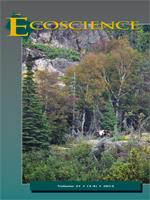Persistence for woodland caribou (Rangifer tarandus) in Pukaskwa National Park (PNP, Ontario, Canada; 1878 km2) was tied to females finding safe calving areas on offshore islands with a water barrier created by Lake Superior. During 1975–1988, PNP caribou fluctuated around a carrying capacity of 24, but after 1988 the population declined, falling to 5 individuals by 2009. Caribou are now likely extirpated from PNP, even in the absence of any local or increased anthropogenic disturbance since the protected area was created in 1978. As moose (Alces alces) in the region declined concurrently, their relative density remained higher along the Lake Superior coastal strip than further inland, the reverse of the situation during 1975–1988; moose especially held to the coast during heavy snow years. Wolves (Canis lupus) accordingly shifted more of their hunting effort to the coast, likely encountering both moose and caribou with increasing search efficiency. These behaviours are described as a predator—prey “space race” that wolves eventually won.
How to translate text using browser tools
1 September 2014
Losing the Predator—Prey Space Race Leads to Extirpation of Woodland Caribou from Pukaskwa National Park
Arthur T. Bergerud,
Brian E. McLaren,
Ludvik Krysl,
Keith Wade,
William Wyett
ACCESS THE FULL ARTICLE

Ecoscience
Vol. 21 • No. 3–4
September 2014
Vol. 21 • No. 3–4
September 2014
Canis lupus
caribou des bois
loups
parc national Pukakswa
predation
prédation
Pukaskwa National Park




